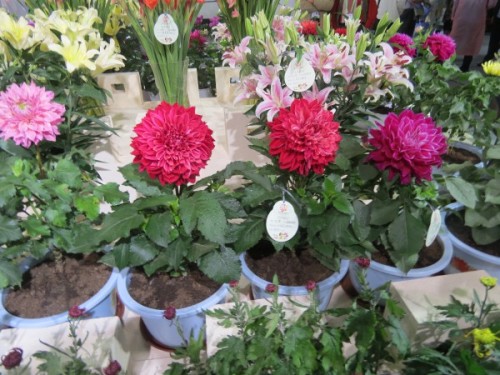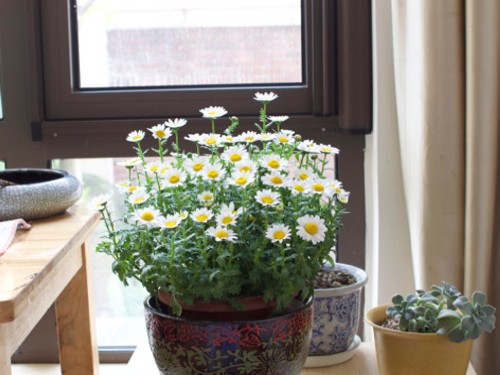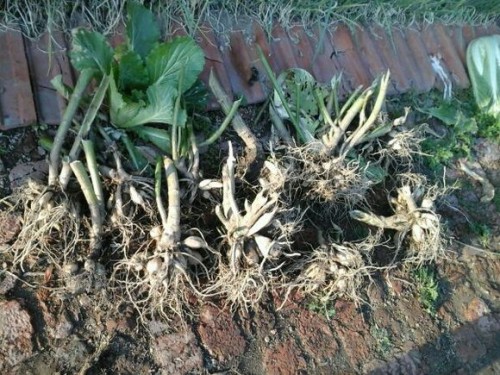Planting method of potted dahlia in family
Dahlia, also known as passion flower, dahlia peony, flower posture fullness, elegant, colorful, peaceful demeanor. Mexicans regard it as a symbol of generosity and richness, so they honor it as the national flower. According to statistics, there are more than 30,000 varieties in the world, and it is one of the world's famous flowers. Don't blame dahlia development so fast, if you have seen dahlia colorful, passionate like fire will not help but like.

Cultivation techniques:
Dahlia stem fragile, can not withstand the wind attack, but also afraid of waterlogging, to plant to choose a high dry terrain, good drainage, sufficient sunshine and leeward places, and make high ridges. The plant spacing is about 1 meter for general varieties and 40 cm ~50 cm for dwarf varieties. Dahlia stems are tall, juicy and tender, and pillars should be set up to prevent windbreaks. Watering should master the principle of dry re-watering. After continuous cloudy days in summer, it should be sprayed with clean water to cool down the ground and leaves in time, otherwise the leaves will be scorched and withered. When there is no rain in the summer, in addition to watering every day, water should also be sprayed to cool down. Apply liquid fertilizer every 10 days after budding until the buds are transparent. Before frost, leave 10 cm ~15 cm root neck, cut branches and leaves, dig root tuber, dry on the spot for 1~2 days, and store it indoors with dry sand. The temperature of the storage room is about 5℃.
Potted dahlias are best replaced several times. Choose a shallow basin with a large mouth surface, and at the same time dig the drainage hole at the bottom of the basin as large as possible, and pad a layer of broken tiles as a drainage layer below. The culture soil must contain half sand. For the last pot change, sufficient base fertilizer should be applied to supply sufficient nutrients. Other management should be planted in the same place.
Cut flowers with dahlia, cultivation points planted in the same place, plant spacing 50 cm ~100 cm, growth season half a month topdressing liquid fertilizer, appropriate topping, more reserved lateral branches.
1. Soil: Dahlia is most suitable for growing in loose, fertile, well-drained sandy loam, requiring rotation, moderate fertility requirements, and pH 6.7 -7.8.
2. Sunshine: Dahlia likes light and is not tolerant of shade. If it is placed in shade for a long time, it will grow poorly, its roots will be weak, its leaves will be thin and its stems will be thin, its flowers will be small and pale, and some will not bloom. Therefore, potted dahlias should be kept in a sunny place. Leaf growth period needs to have sufficient light, daily light requirements in more than 6 hours, so that plants thrive, flowers large and plump. If the sunshine is less than 4 hours per day, the branching of stems and leaves and the formation of flower seedlings will be affected to some extent, especially if the rain is less than 4 hours, the flowering will not be smooth, the growth of stems and leaves will be poor, and the disease will be easy.
3, temperature: sexual likes cool climate, the requirements for ecological factors are not strict, so adaptability is strong. During the growth period, the temperature requirements are not strict, and normal growth can be achieved between 5-35℃, but the most suitable temperature is 10-25℃.
4, reproduction: the use of root propagation, this method is the most commonly used. Because dahlias can germinate only at the root neck, they must have part of the root neck when dividing, otherwise they cannot germinate new plants. In order to facilitate identification, the method of pre-buried roots is often used for germination, and the adventitious buds on the root neck are divided and planted after germination. The method of root division is simple and easy, with high survival rate and strong seedlings, but the number of reproductive plants is limited.
5. Watering: The size of watering can control the height of dahlia plants. Water should be controlled at seedling stage to promote dwarfing. In summer, in order to reduce the temperature, increase the air humidity and reduce the evaporation of water from dahlia stems and leaves, water should be sprayed 1~2 times a day. Watering once at 3~4 p.m., the amount of watering should not be too large.
6, fertilization: Dahlia love fertilizer, growth period 7~10 days should be applied topdressing once, or thin liquid fertilizer 2 to 3 times. However, because dahlias are afraid of heat, they are often in a semi-dormant state in summer. At this stage, no fertilizer or extremely thin fertilizer can be applied. After budding, phosphorus application can be increased to make flowers bloom better. Dahlia roots more delicate, throughout the growth process are taboo fertilizer.
7. Cultivate dahlias with medium and small flowers, and only remove the lateral buds on the lower nodes of the stem to make them bloom one after another. If you want to cultivate a large single flower, should only retain the top bud, the rest of the lateral buds removed. At the end of June and the beginning of July, after the first flower, the weather is getting hotter and the plant growth slows down. At this time, pruning can be carried out. When pruning should first be in the middle of the branches, the middle of the two leaves will be twisted and drooping stems, leaving a height of 20~30 cm. After a few days, the wound partially dried and was cut again. This prevents rainwater from pouring into the hollow stem and causing decay. In October, it will bloom again.
8, pruning: pests: dahlia generally mainly appear powdery mildew, gray mold, bacterial wilt, virus disease, moth and other pest problems, to regularly spray chemicals for treatment.
Time: 2019-05-25 Click:
- Prev

Cultivation method of potted white crystal chrysanthemum
White crystal chrysanthemum likes sunny and cool environment, lack of light poor flowering. Cold tolerance, not high temperature tolerance, suitable temperature for growth is 15℃ to 25℃, flower bed cultivation above-5℃ can safely overwinter,-5℃ for a long time below the low temperature, leaves frozen, dry and yellow, when the temperature rises still sprout leaves, pregnant buds bloom
- Next

How to grow Dahlia bulb-- planting method
Dahlia, also known as Dahlia, Tianzhu peony, sweet potato flower, marble, passionflower and chrysanthemum, is a perennial herb of Compositae. The chrysanthemum is in full bloom, but the dahlia is different. it blossoms one after another in spring and summer, blossoms again after summer, and withered when Frosts Descent. Its flower shape is similar to that of the beautiful peony, and its color is magnificent and colorful.
Related
- Fuxing push coffee new agricultural production and marketing class: lack of small-scale processing plants
- Jujube rice field leisure farm deep ploughing Yilan for five years to create a space for organic food and play
- Nongyu Farm-A trial of organic papaya for brave women with advanced technology
- Four points for attention in the prevention and control of diseases and insect pests of edible fungi
- How to add nutrient solution to Edible Fungi
- Is there any good way to control edible fungus mites?
- Open Inoculation Technology of Edible Fungi
- Is there any clever way to use fertilizer for edible fungus in winter?
- What agents are used to kill the pathogens of edible fungi in the mushroom shed?
- Rapid drying of Edible Fungi

